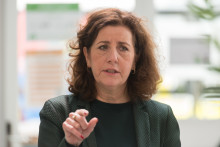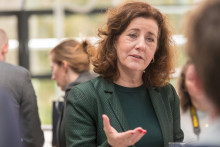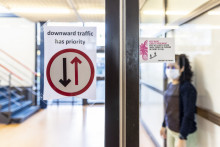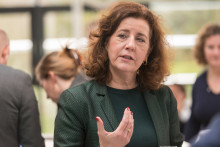The situation surrounding the pandemic is moving in the right direction, with a significant drop in the number of coronavirus patients. But will it stay this way? The government is not as yet venturing to say how things will be in September. We’ll have to wait until mid-August for that.
Thus, higher education will have to prepare for two different scenarios, Ministers De Jonge and Rutte said Friday evening during their press conference. The next day, Minister Van Engelshoven sent a letter to educational institutions.
‘Therefore, I am asking you to prepare for one situation where social distancing measures have been relaxed’, she writes, ‘and at the same time to have a fall-back scenario ready with social distancing restrictions still in place.’
Too late
This is not the kind of thing the Dutch National Student Association ISO and National student organisation LSVb were hoping to hear. ‘The whole country has been allowed to go back to the office, to go on holiday and to festivals, but students are again being kept hanging’, Lisanne de Roos, the new chairperson of ISO, says. ‘It’s unfathomable that students and institutions have to be kept in uncertainty even longer about how the upcoming academic year will be organised: 13 August is really much too late.’
The LSVb believes institutions should plan for ‘the best scenario’, new chairperson Ama Boahene says, and that means a return to physical classroom education.
They are not alone. ‘Universities of applied sciences are assuming the most optimal scenario: no more social distancing after 15 August’, Maurice Limmen, chairperson of the Netherlands Association of Universities of Applied Sciences, says. ‘We are ready to re-open our campuses completely and responsibly.’
Good news
Universities would also rather not think about restrictions. ‘It’s really good news that almost all coronavirus restrictions for higher education are being terminated’, Pieter Duisenberg, chairperson of the Association of Universities in the Netherlands, says. ‘That means that first-year students will be able to enjoy their introduction week and we can look forward to a new academic year without restrictive measures.’
Despite the importance of physical classroom education, universities are nonetheless pleased with online learning, at least in part. ‘Universities will be adopting the good elements of remote learning in order to make further improvements to their educational programmes’, reads one response.
They are thinking about ‘blended learning’ programmes, a mix of physical and virtual classes. They also see something in ‘offering lecturers more intensive technological and pedagogic support’ in their teaching, according to a brief statement on the website.
Albeda College
Seen in this light, online education is thus not going anywhere yet, despite all the cheering about phasing out coronavirus restrictions. How will it all play out in practice? It’s still a waiting game.
The secondary vocational school Albeda College in Rotterdam is the first to explicitly announce that even after the coronavirus crisis, some of their courses will still be offered online. ‘Covid-19 has taught us a lot; we want to avoid returning to the way it was before’, the chairperson of the College says. ‘Onward to the new normal.’








